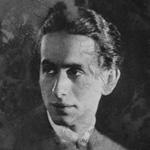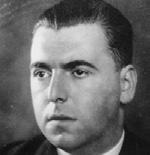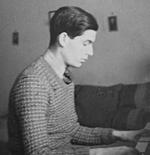THE FLORIDA STATE UNIVERSITY
College of Music presents
Silenced Voices Chamber Music Series:
Music of the Composers Persecuted by Nazis
Advanced New Music Seminar Student Recital
Benjamin Sung and David Kalhous, Directors
Monday March 27, 2023
5:30 p.m. | Longmire Recital Hall
Trio for Violin, Viola and Cello (1944)
PROGRAM
Gideon Klein
I. Allegro (1919–c.1944)
II. Variations on a Moravian Folksong. Lento
III. Molto vivace
Tommaso Bruno, violin
Luiz Carlos Barrionuevo, viola
Giancarlo Ortiz, cello
Fünf Pittoresken für Klavier, Op. 31 Erwin Schulhoff
I. Zeitmaß Foxtrott (1894–1942)
II. Zeitmaß Ragtime
III. In futurum. Zeitmaß-zeitlos. (tutto il canzone con espressione e sentimento ad libitum, sempre, sin al fine!)
IV. Zeitmaß “One-Step” V. Zeitmaß “Maxixe”
Yunyao Liu, Becca Harrison, Melody Morrison, Huixue Li, piano
Hans Krása (1899–1944)
Benjamin Sung, violin 1
Hannah MacLean, violin 2
Miriam Tellechea, viola
Boyan Bonev, cello
To Ensure An Enjoyable Concert Experience For All…
Please refrain from talking, entering, or exiting during performances. Food and drink are prohibited in all concert halls. Recording or broadcasting of the concert by any means, including the use of digital cameras, cell phones, or other devices is expressly forbidden. Please deactivate all portable electronic devices including watches, cell phones, pagers, hand-held gaming devices or other electronic equipment that may distract the audience or performers.
Recording Notice: This performance may be recorded. Please note that members of the audience may at times be included in this process. By attending this performance you consent to have your image or likeness appear in any live or recorded video or other transmission or reproduction made in conjunction to the performance.
Florida State University provides accommodations for persons with disabilities. Please notify the College of Music at (850) 644-3424 at least five working days prior to a musical event to request accommodation for disability or alternative program format.
Thema and VariationsThe Czech pianist and composer Gideon Klein was born in Prerov in 1919 into a MoravianJewish family. He began to study piano (with Ruzena Kurzová and Vilém Kurz) and composition (with Alois Hába) but this stopped when the Nazis closed all the institutes of higher learning after occupying Czechoslovakia in March 1939. For a while he played the piano under false names and was offered a scholarship at the Royal Academy of Music in 1940, but the anti-Jewish legislation meant that he couldn’t travel there.



On 1 December 1941 he was deported to Terezín, where he became one of leading lights of the music life there (alongside Pavel Haas, Hans Krása and Viktor Ullmann). He wrote a lot of music, gave at least fifteen recitals and played chamber music. After nearly three years in Terezín, he was deported, first to Auschwitz and then to the Fürstengrube labour camp, where he died, aged twenty-six (in unknown circumstances on approximately 27 January, 1945) during the liquidation of Fürstengrube.
Erwin Schulhoff was a child prodigy who, in 1902 at the age of eight, so deeply impressed Antonín Dvořák with his playing and improvising on the piano that Dvořák advised him to begin composition studies immediately. Schulhoff studied first in Prague, then in Vienna, where he became a good friend of Alban Berg, and later in Leipzig, where he studied with Max Reger. He also took some lessons with Debussy in Paris shortly before World War I.
Schulhoff’s musical interests varied widely. He collaborated with visual artists Däubler, Grosz, and Klee in Germany, where he had settled in 1923. A champion of modern music, he worked on the problems of quarter-tone music with Alois Hába after his return to Prague in 1929. His improvisatory skills naturally led to his dedication as a jazz pianist and to the incorporation of jazz in several of his own compositions. He also showed great interest in music of the distant past, unearthing and arranging medieval and Renaissance music of Bohemian composers.
Schulhoff’s desire for social revolution led to his leftist political views. In 1932 he composed a cantata setting of the original German text of the Communist Manifesto of 1848. He was granted Soviet citizenship to protect him from arrest during the Nazi occupation of Czechoslovakia in 1939, but when the Nazis invaded Russia in 1941 Schulhoff was sent to the Wülzburg Concentration Camp where he died on August 18, 1942.
Born of mixed German/Czech parentage, Hans Krása studied at the German Music Academy in Prague. Zemlinsky, his mentor, encouraged an interest in Mahler and early Schoenberg. In the 1920s, he was influenced by French music, particularly Debussy, Ravel, Les Six and Stravinsky. He travelled to Paris to study with Roussel for a few months and then to the Berlin Conservatory. His successes included Symphony taken up by Koussevitzky in Boston, and the prize-winning opera Verlobung im Traum, conducted at the German Theatre in Prague by Szell. His theatrical collaborations with Czech playwright Adolf Hoffmeister included the children’s opera Brundibar, (1938). After the Munich Pact he did not escape from Prague before the German occupation in 1939 and in 1942 he was deported to Terezín. A revised version of Brundibar received 55 performances at Terezín and was immortalized in a Nazi propaganda film. His compositions from his final years include Overture for Small Orchestra and Three Songs for baritone, clarinet, viola and cello. Krása was executed in Auschwitz concentration camp in 1944.
